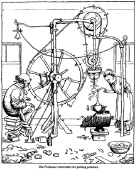
|
||||||||||||||||||||||||||||||||||||||||||||||||||||||
|
Photos from tonight's TechCrunch party in Menlo Park. Apparently some ISPs are inserting ads in web content as their customers surf. Jason Calacanis: "It makes no sense to me to build inside of someone else's platform when you have the wide open internet out there to develop on." Frank Zappa: "Gotta meet the Gurneys and a dozen gray attorneys."
I've been reading various posts and comments, and see a thread that's still out there. People doubt that there's a way to make money with Twitter. To that I say, they haven't been reading this blog. Now seems like a good time to pause and review what Twitter is. 1. It's a network of users, with one kind of relationship: following. I can follow you, and you can follow me. Or I can follow you and you don't follow me. Or you can follow me, and I don't follow you. Or neither of us follow each other. Pretty simple. Just arrows at either or both ends of the line, or no line at all. There are no labels on the arcs. 2. It's a micro-blogging system. Posts are limited to 140 characters. Enough for a bit of text and a link. This is a powerful idea, but not a new one. If you read Scripting News before February of this year, it was partially a micro-blogging system. When it started in April 1997, it was all micro-blogging. The earliest websites, from TBL, NCSA and Netscape were also micro-blogging systems. An aside, I gave a talk on Sunday at the WordPress users conference. One of the things we talked about was micro-blogging. I asked the people if they would like it if the only way you could create a WordPress site was on wordpress.com. They agreed that would not be good. Analogously, if micro-blogging is to become a real art, there will have to be many ways to create a micro-blog, and lots of RSS to tie them together.
4. An ecosystem. Twitter's API is very simple. It covers the entire functionality, leaves nothing out. You could implement the Twitter user interface using the API. That's a key thing. Compare it to Apple, who reserves for itself and a few partners, under terms we don't know, the right to develop rich apps for the iPhone. Twitter takes the traditional PC industry approach, give everyone equal power, make it a level playing field and let the chips fall where they may. This means that if the people at Twitter miss an opportunity, the rest of us have a shot at providing it for ourselves and others.
Twitter is still a very interesting service, and as long as it remains as open as it is, we can all learn from and alongside them. 4/28/07: Twitter as coral reef. Harold Gilchrist: "Some actually see that Web/SMS Gateway as a key component of their architecture." Scoble is Twittering about Twitter from Twitter with Twitter. 2/22/00: "Watching them watch us watching them watching us watching them." |
Dave Winer, 52, pioneered the development of weblogs, syndication (RSS), podcasting, outlining, and web content management software; former contributing editor at Wired Magazine, research fellow at Harvard Law School, entrepreneur, and investor in web media companies. A native New Yorker, he received a Master's in Computer Science from the University of Wisconsin, a Bachelor's in Mathematics from Tulane University and currently lives in Berkeley, California. "The protoblogger." - NY Times.
"The father of modern-day content distribution." - PC World.
"Helped popularize blogging, podcasting and RSS." - Time.
"The father of blogging and RSS." - BBC.
"RSS was born in 1997 out of the confluence of Dave Winer's 'Really Simple Syndication' technology, used to push out blog updates, and Netscape's 'Rich Site Summary', which allowed users to create custom Netscape home pages with regularly updated data flows." - Tim O'Reilly.
My most recent trivia on Twitter. Comment on today's On This Day In: 2006 2005 2004 2003 2002 2001 2000 1999 1998 1997.
|
|||||||||||||||||||||||||||||||||||||||||||||||||||||
|
© Copyright 1997-2007 Dave Winer. Previous / Next |
||||||||||||||||||||||||||||||||||||||||||||||||||||||
 Congrats to the lead investors,
Congrats to the lead investors,  3. A relatively open identity system. I've said it
3. A relatively open identity system. I've said it 


